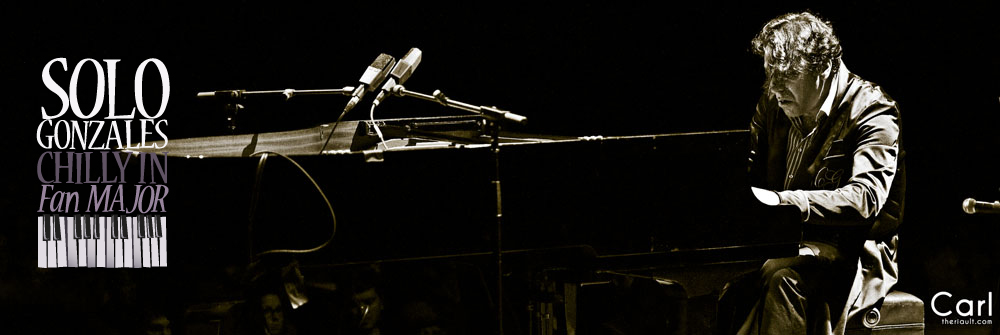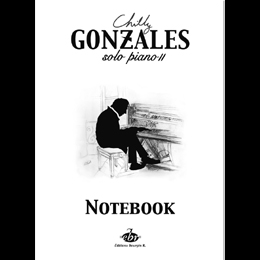In the computing industry, source code is the key to practically every electronic item currently produced. If you have the source code to an application, you can study it, modify it, and (sometimes) release new versions. Writing great code is definitely an art form; it can be elegant, efficient, and channel the personality of the developer. It’s relatively easy to understand and replicate code once it has been written, but it’s an entirely different matter to develop a piece of brilliant code in the first place.
What does source code have to do with Chilly Gonzales? It just so happens that Gonzales sells his unique form of ‘source code’ – the Solo Piano notebooks. The notebooks are a faithful replication of Gonzales’ Solo Piano compositions, which means that they contain the basic information required to play Solo Piano songs. Yes, it does take a true virtuoso like Gonzales to really bring the songs to life, but studying and playing the notebooks offers information beyond the notes themselves. The notebooks are also a glimpse into Gonzales’ thought processes, techniques, style, humour, and virtuosity. Just like it takes more than source code to maintain a program, it takes more than a songbook to play like Gonzales, but part of the pleasure is in exploration and experimentation.
The form factor of the Solo Piano II notebook is impressive – almost 40% larger than other songbooks. It’s as if Gonzales said, “Fuck those tiny songbooks – mine’s going to be bigger!” The pages are thick and yet stay open – even at the beginning and end. There’s a nice intro on the inherent weakness of the piano as an instrument, plus space for notes at the end. The Solo Piano II notebook is definitely a keepsake that will last for many years of playing, but Gonzales would probably be happier if you ended up with an old, worn-out copy!
Gonzales once said something to the effect of, “When I was young, I used to find the most challenging songs I could, and transcribe them.” There’s a corollary to that in the source code industry: reverse engineering. A developer has to exactly mimic the actions (outputs based on inputs) of an original program without seeing the original source code. It’s a tedious process that is generally fraught with errors. The easier way is to license the code from the original developer. Likewise, you could spend time ‘reverse engineering’ the Solo Piano II songs into sheet music – Gonzales even has PianoVision videos available for many of the songs to assist. But the Solo Piano II songbook is unparalleled in quality, and would be a welcome addition to any musicians’ library – regardless of skill level.
The Solo Piano II notebook is available at Chilly Gonzales’ online store.


Well written piece. You are spot on about the need to expand on the simple sketches provided in the solo piano notebooks. This is what Gonzales does live and is a hallmark of a truly great musician. I would rather see a musician redefine a piece through passion and interpretation on the spot than see another one take a piece and perfect every note, with no mistakes or musical detours, in a cold, precise rendition. The idea and heart of a piece are what matters, the exact way to express them are subjective and individual. If we are melancholy one day, we should allow our mood to flow forth into the music, even if that involves transforming a sprightly, major piece into a minor like ballad. It is crucial that we tell the truth, because when we do, our honesty enhances the music.
Thanks for the thoughtful reply! I think Gonzales alluded to the concept of redefinition that you mention in a recent stereogum interview:
“…you have to kind of undo the preparation — I’m quoting Miles Davis, but learn everything and forget everything. You have to learn the whole song so well that I’m not worrying about where my fingers are going…”
I think you also nailed it about letting honesty enhance the music, but what do you do if you’re on tour and playing the same song for the 100th time? The only honest feeling that may arise is boredom! Gonzales seems to have learned how to infuse emotion into every performance long ago. Here’s a quote from 1996, while touring with his band “Son”:
“When we were out with Barenaked Ladies, I used to wonder how they could still do ‘If I Had A Million Dollars’ and mean it. I understand a little better now.”
Internalizing whatever you are actually feeling and injecting emotion into a performance is the hallmark of a truly great entertainer.